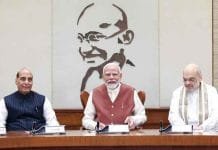INVC NEWS
New Delhi ,
Controversy looms over the upcoming G-20 meeting scheduled to be held in Srinagar, as speculations arise that several countries might choose not to attend this prestigious event. The controversy surrounding the meeting in Jammu and Kashmir has escalated to an international level, raising concerns about the security arrangements and prompting potential boycotts.
The release of a report by the US State Department highlighting attacks on minorities in India has further fueled the controversy. India, as the Chair of the G-20, has firmly rejected the report, emphasizing that it has the prerogative to host the meeting in any part of the country. The Indian government asserts that it is incorrect to associate the G-20 meeting in Jammu and Kashmir with the human rights situation of India’s minorities and Kashmiri Muslims.
Against this backdrop, it is essential to delve into the various reasons that may lead certain countries to refrain from attending the G-20 meeting in Srinagar. The following factors contribute to the growing concerns:
Security Concerns: Given the complex security landscape in the region, some countries are apprehensive about the safety of their representatives. The volatile situation in Jammu and Kashmir, coupled with the possibility of terrorist infiltration, has prompted heightened security measures. To ensure the safety of foreign guests, advanced anti-drone technology is being employed, and a high state of alertness has been declared. The Border Security Force (BSF) is actively patrolling the borders, and stringent security arrangements have been put in place.
Human Rights Debate: The association of the G-20 meeting with the human rights issues in Jammu and Kashmir has sparked a global debate. Certain nations express concerns about the treatment of minorities in India and the situation in Kashmir. These concerns have created a dilemma for their participation in the event, as they weigh their commitment to the G-20 against their stance on human rights.
Diplomatic Considerations: In the realm of international politics, decisions to attend or boycott significant events like the G-20 meeting can be influenced by diplomatic factors. Countries may opt to abstain from participation as a symbolic gesture to convey their dissatisfaction with specific policies or actions of the host nation. Diplomatic tensions or disagreements on other global issues could also affect their decision.
National Interests: Each country evaluates the potential benefits and drawbacks of attending the G-20 meeting based on its own national interests. Economic considerations, geopolitical dynamics, and bilateral relations with India are among the factors that shape their decision-making process. If attending the meeting aligns with their strategic goals and offers substantial advantages, countries are more likely to participate.
While the possibility of a boycott by some countries persists, it is important to note that the final decision rests with each participating nation. The G-20 meetings serve as a platform for global cooperation, economic discussions, and policy coordination. The host country holds the responsibility of ensuring a conducive environment for productive dialogue and fostering a spirit of inclusivity among all attendees.
In conclusion, the controversy surrounding the G-20 meeting in Srinagar has generated significant international attention. Concerns over security, human rights, diplomatic considerations, and national interests have led to speculation about potential boycotts. As the meeting approaches, it remains to be seen how these factors will influence the final attendance and whether alternative arrangements may need to be made. The G-20 platform, aimed at addressing global challenges, should strive to maintain its integrity and promote open dialogue among nations.
















